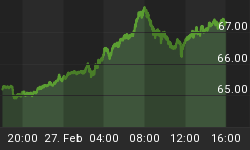The minutes of the March 8 meeting of the Bank of England's (BoE) Monetary Policy Committee (MPC) have caught the markets by surprise, with an unexpectedly-dovish 8-1 vote to leave rates on hold, and the one dissenter a vote for a rate cut. The members noted that "the upside risk to inflation from wage growth might have started to diminish," and "financial market volatility added to the case for holding rates." So, can we assume that the current 5.25% repo rate is the peak? Not yet.
Yesterday came the news that the EU-harmonized rate of inflation , HICP, hit 2.8% in February, up from 2.7% in January - still far above the BoE's 2.0% medium-term target. The Retail Prices Index (RPI), the basis for most wage negotiations, climbed to a 16-year high of 4.6%. Last week, the BoE's quarterly inflation survey found that expectations for the rate of inflation over the coming year were unchanged from the November survey, at 2.7%. While this remains well above the BoE's 2.0% target, the stabilization of expectations is likely to be comforting to the members of the MPC. However, with the RPI at a 16-year high, there is still a risk to inflation expectations.

Last week's report on average earnings showed the fastest three-month rate of growth since the summer, with November-January earnings up an annual 4.2% (4.0% in October-December). However, excluding bonuses, which were concentrated in the booming financial services industry, earnings growth eased from 3.7% to 3.6% - suggesting that the closely-watched January pay round was relatively benign.

The British Bankers' Association reported a fall in the growth of credit card debt in February, marking seven straight months of lower consumer borrowing. On the other hand, the housing market continues to show a surprising level of resilience despite three rate hikes since last August. Underlying net mortgage lending rose by a still-robust £5.2 billion in February, down only slightly from £5.4 billion in January. Still, this did mark three successive months in which lending rose by slightly less than the month before, suggesting that we may be seeing the start of a moderating trend. However, data from the Building Societies' Association showed that mortgage approvals, a forward looking indicator of housing demand, rose a seasonally adjusted £5.4 billion last month, down only slightly from the record-high £5.8 billion seen in January, and the highest level on record for the month of February. And, money supply growth remains strong, climbing an annual 12.8% in February (12.9% in January). All told, it is too soon to call the end of the current housing cycle recovery.
Over on the fiscal side of the policy equation, Chancellor (and PM-in-waiting) Brown today delivered his eleventh consecutive annual budget (making him the longest-serving Chancellor since the 1820s). It clearly was designed to win back support for the Labour Party ahead of PM Blair's retirement (expected within the next six months) without totally undermining Brown's reputation for relative fiscal prudence. The Chancellor announced headline-catching cuts in the basic rate of income tax and in the corporation tax, but also tweaked some other tax margins such that the overall impact of fiscal policy should be broadly neutral. However, Brown's forecast of a gradually-narrowing fiscal deficit looks overly optimistic. It is based on the assumption that GDP growth will climb as high as 3.25% this year and 3.00% in 2008. With this year's growth likely to be closer to the 2.74% seen in 2006, tax revenue is likely to fall short of the projection.
So, where does all this lead interest rates? The prospect of one more rate hike in April or May has dimmed a little but not disappeared. In its February Inflation Report the BoE concluded that inflation would be slightly above the 2.0% target in two years time if the repo rate stayed at 5.25%. And while the MPC seems to be feeling more sanguine - even the two most hawkish members voted to stay on hold this month - they are not yet ready to rule out the need for additional tightening. The minutes note that most members felt that risks to inflation in the medium-term remain "on the upside" due to capacity constraints, strong price intentions among businesses and strong money supply growth. Key reports due before the April 5 MPC meeting include February retail sales (March 22), and BoE consumer credit and mortgage lending for February, due on March 29.















